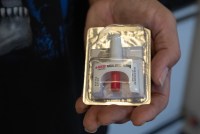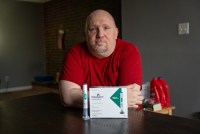Latest Morning Briefing Stories
Brote de sarampión: Florida dice que niños no vacunados pueden ir a la escuela, desafiando a los CDC
La mayoría de las personas que no están protegidas por una vacuna contraerán sarampión si se exponen al virus. Existe riesgo de muerte.
Opposition to Medicaid Expansion Thaws in an Unexpected Place: The Deep South
For more than a decade, some Southern states have resisted Medicaid expansion under the Affordable Care Act, even though data suggest it could help their residents. Today, the large majority of uninsured Americans who would gain coverage under Medicaid expansion — and who would benefit from affordable access to care — live in non-expansion states […]
Pregnancy Care Was Always Lacking in Jails. It Could Get Worse.
A lack of oversight and standards for pregnancy care in jails is becoming more problematic as the number of incarcerated women rises and abortion restrictions put medical care further out of reach.
The state’s surgeon general grants parents permission to send unvaccinated children to school during a measles outbreak, risking their health and that of others.
What the Health? From KFF Health News: Alabama Court Rules Embryos Are Children. What Now?
In a first-of-its-kind ruling, the Alabama Supreme Court has determined that embryos created for in vitro fertilization procedures are legally people. The decision has touched off massive confusion about potential ramifications, and the University of Alabama-Birmingham has paused its IVF program. Meanwhile, former President Donald Trump is reportedly planning to endorse a national 16-week abortion ban, while his former administration officials are planning further reproductive health restrictions for a possible second term. Lauren Weber of The Washington Post, Rachana Pradhan of KFF Health News, and Victoria Knight of Axios join KFF Health News’ Julie Rovner to discuss these issues and more. Plus, for “extra credit,” the panelists suggest health policy stories they read this week that they think you should read, too.
Lawsuits Claim South Carolina Kids Underwent Unnecessary Genital Exams During Abuse Investigations
Lawsuits allege that several children under 18 in South Carolina have undergone examinations of their private parts during child abuse investigations — even when there were no allegations of sexual abuse. There’s a growing consensus in medicine that genital exams can be embarrassing, uncomfortable, and even traumatic.
Health Care Workers Push for Their Own Confidential Mental Health Treatment
Montana may join about a dozen other states in creating “safe havens” that keep health care professionals from facing scrutiny from licensure boards for seeking mental health or addiction treatment.
Death and Redemption in an American Prison
More than a quarter century after an inmate helped start a hospice program in one of the nation’s most notorious prisons, he is trying to spread the idea.
The Powerful Constraints on Medical Care in Catholic Hospitals Across America
The expansion of Catholic hospitals nationwide leaves patients at the mercy of the church’s religious directives, which are often at odds with accepted medical standards.
Southern Lawmakers Rethink Long-Standing Opposition to Medicaid Expansion
While many Republican state lawmakers remain firmly against Medicaid expansion, some key leaders in holdout states are showing a willingness to reconsider. Public opinion, financial incentives, and widening health care needs make resistance harder.
What the Health? From KFF Health News: Biden Wins Early Court Test for Medicare Drug Negotiations
A federal district court judge dismissed a lawsuit attempting to invalidate the Biden administration’s Medicare prescription-drug price negotiation program. But the suit turned on a technicality, and several more court challenges are in the pipeline. Meanwhile, health policy pops up in Super Bowl ads, as Congress approaches yet another funding deadline. Alice Miranda Ollstein of Politico, Lauren Weber of The Washington Post, and Rachel Cohrs of Stat join KFF Health News’ Julie Rovner to discuss these issues and more. Plus, for “extra credit,” the panelists suggest health policy stories they read this week they think you should read, too.
States Get in on the Prior Authorization Crackdown
Last month, my colleague Lauren Sausser told you about the Biden administration’s crackdown on insurance plans’ prior authorization policies, with new rules for certain health plans participating in federal programs such as Medicare Advantage or the Affordable Care Act marketplace. States are getting in on the action, too. Prior authorization, sometimes called pre-certification, requires patients […]
Nuevas normas de elegibilidad son un alivio financiero para casi 2 millones de personas en Medi-Cal
Este grupo se equiparará a los aproximadamente 12 millones de otros beneficiarios que no tienen límites de activos.
Early Detection May Help Kentucky Tamp Down Its Lung Cancer Crisis
After a decade of work, a Kentucky program launched to diagnose lung cancer earlier is beginning to change the prognosis for residents by catching tumors when they’re more treatable.
New Eligibility Rules Are a Financial Salve for Nearly 2 Million on Medi-Cal
Nearly 2 million Medi-Cal enrollees, mainly people who are aged, disabled, or in long-term care, can now accumulate savings and property without limitations and still qualify for the state’s health insurance program for low-income residents. They join an additional roughly 12 million enrollees who already had no asset limits.
California Prison Drug Overdoses Surge Again After Early Treatment Success
Drug overdose deaths in California state prisons rebounded to near record levels last year, a big setback for corrections officials who thought they were on the right track with medication-assisted treatment efforts. Prison officials and attorneys representing prisoners blame fentanyl.
¿Ofrecer vivienda gratis es atención médica? Programas de Medicaid dicen que sí
Estados están invirtiendo miles de millones de dólares en un experimento de atención médica de alto riesgo: utilizar fondos ya escasos de seguros de salud públicos para proporcionar vivienda a los estadounidenses más pobres y enfermos.
States Target Health Insurers’ ‘Prior Authorization’ Red Tape
Doctors, patients, and hospitals have railed for years about the prior authorization processes that health insurers use to decide whether they’ll pay for patients’ drugs or medical procedures. The Biden administration announced a crackdown in January, but some state lawmakers are looking to go further.
GoFundMe Has Become a Health Care Utility
Resorting to crowdfunding to pay medical bills has become so routine, in some cases health professionals recommend it.
For the first time, a jury has convicted a parent of a school shooter of charges related to the child’s crime, finding a mother in Michigan guilty of involuntary manslaughter and possibly opening a new legal avenue for gun control advocates. Meanwhile, as the Supreme Court prepares to hear a case challenging the FDA’s approval of the abortion drug mifepristone, a medical publisher has retracted some of the journal studies that lower-court judges relied on in their decisions. Alice Miranda Ollstein of Politico, Sarah Karlin-Smith of the Pink Sheet, and Rachana Pradhan of KFF Health News join KFF Health News’ Julie Rovner to discuss these issues and more. Plus, for “extra credit,” the panelists suggest health policy stories they read this week that they think you should read, too.





















